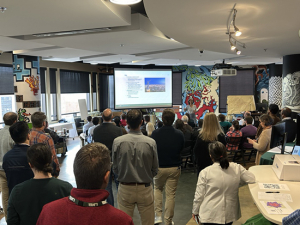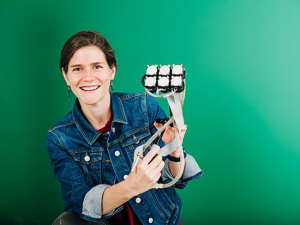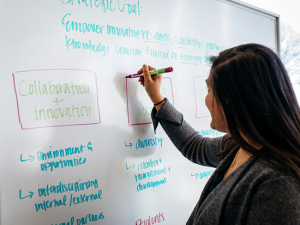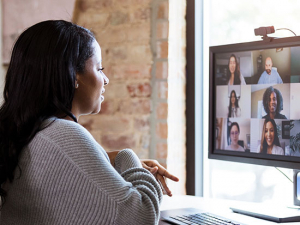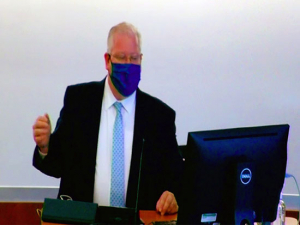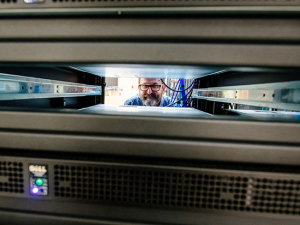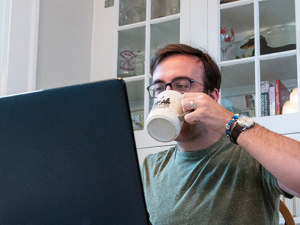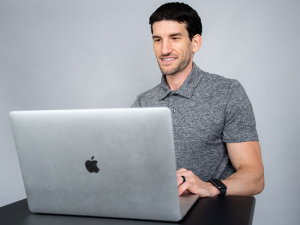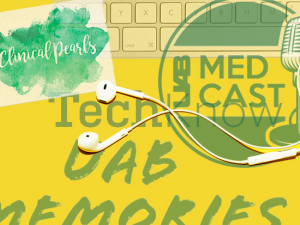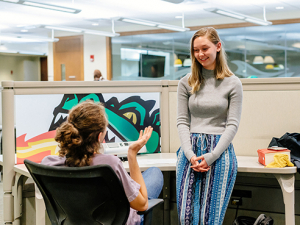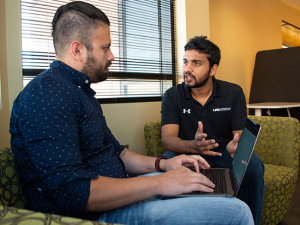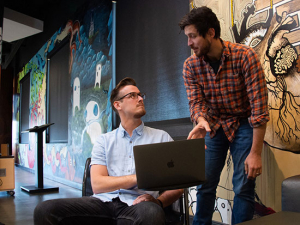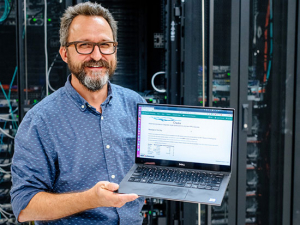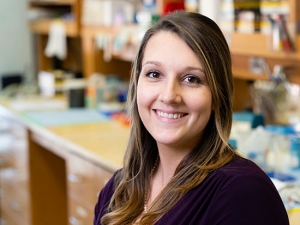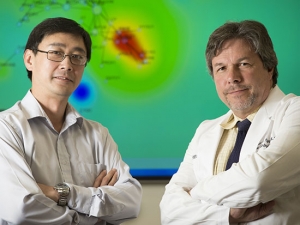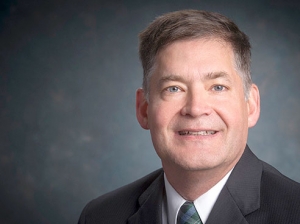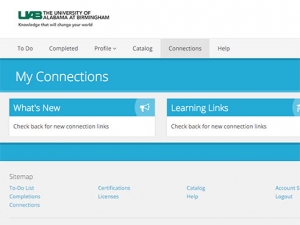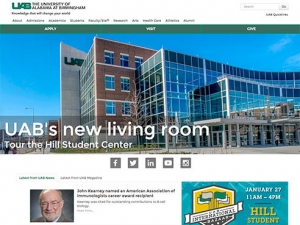-
Why you should add emergency contacts in Oracle todayFind out how this confidential information can help you in the event of an illness, hospitalization or other emergency situation.posted a while back 3242 views
-
With Microsoft’s Copilot AI tool available to all Blazers, faculty prepare for fall 2024
“Using AI in the Classroom” workshops at the Center for Teaching and Learning are drawing lots of attention from faculty. CTL Director Amy Chatham, Ph.D., explains why and shares tips on a helpful new book and getting the most out of generative AI.
posted a while back 4919 views -
UAB researchers explain how GIS has transformed their workGeographic information systems technology is being used to study mortgage decisions, drinking behavior, environmental injustice, and the link between redlining and colon cancer. All Blazers now have free access to ArcGIS software.posted a while back 4330 views
-
3 new tech certifications available at no cost through UAB Libraries membership
Through a new membership with the Unity Academic Alliance, UAB students and employees can earn industry-recognized certifications in programming, artistry and game development at no cost from Unity, a real-time software development platform used create content for virtual, augmented and mixed reality, AI-driven simulations, 2D and 3D video games.
posted a while back 6009 views -
What could you do with a 3D printer? 12 fellow Blazers show off their projectsUsing machines at UAB Libraries or in their own units, staff, students and faculty are making tools for their research projects, classrooms and HVAC units campuswide. See their work and find out how you can get started.posted a while back 8391 views
-
This updated online toolkit can guide your students’ research
The CAS Research Sources and Skills Toolkit focuses on efficient research strategies, evaluation of source material, appropriate techniques for documenting source material and more — and now features more pop-up activities and quizzes, plus a tour-guide function.
posted a while back 4609 views -
Dimensions software gives faculty, staff edge in planning research investments
Any member of the UAB community can set up a free account and explore a more data-driven approach to strategic planning for research. Engineering Dean Jeffrey Holmes, M.D., Ph.D., explains how his school used Dimensions to assist in new faculty hiring.
posted a while back 10742 views -
Toolkit provides research resources for social determinants of health
The free toolkit, with validated data resources and original source documents, is housed in UAB’s Canvas platform and accessible with a Blazer ID.
posted a while back 7465 views -
Here’s how to navigate the Campus Calendar like an expertLectures, art exhibits, concerts, add-drop deadlines and more can all be found at calendar.uab.edu. Matt Cuthbert, UAB’s resident calendar expert, offers tips for using the calendar most effectively.posted a while back 7645 views
-
The neverending story: How IT reaches millions with its infinite loopsSee the must-share UAB memes going over big online and get tips on making your own GIF empire.posted a while back 9666 views
-
UAB is migrating to a new tool to manage staff job descriptions
The JobArchitect platform will provide improved security, search functions and responsiveness.
posted a while back 7869 views -
Try these SMART alternatives for your team’s 2021 #goals
OKR and CLEAR are two goal-setting methods that may be better suited for work on teams or groups.
posted a while back 16270 views -
Putting your best face forward on Zoom
Easy tips and tricks from UAB experts on how to look your best, professionally and personally, during video meetings.
posted a while back 12356 views -
See UAB's lecture-capture tech in action
Watch a demonstration of automated lecture recording from Heritage Hall, find out what tech will be in the classrooms where you teach and register for hands-on or virtual training today.
posted a while back 14142 views -
UAB’s supercomputer can now crunch PHI — here’s what that means for researchers
Cheaha now is certified for use with protected health information, including medical records and genomic data, which investigators describe as a “big deal.”
posted a while back 9175 views -
Even during a pandemic, the library is still the heart of the university
The physical locations are closed, yet UAB Libraries is busier than ever. It’s just all happening in a flurry of ones and zeroes: online requests for curbside pickup, chat with librarians, access custom remote instruction and soon — digitized print materials from the stacks.
posted a while back 9486 views -
First time on Zoom? What you need to know to help you avoid being THAT person
8 tips and tricks for a better video meeting experience.
posted a while back 16472 views -
Listen while you work
UAB podcasts can help you stay safe online, sharpen your skills and connect with fellow Blazers.
posted a while back 10271 views -
9 items to keep your work on-brand — from email to PowerPoint
It’s important that UAB’s branding convey what the name signifies — innovation, collaboration, diversity and strong community partnerships — and the UAB Brand and Communication Toolkit helps ensure that employees have the resources to do that.
posted a while back 13756 views -
A $2.2 million investment transforms UAB Libraries into 21st-century learning spaces
The multimillion-dollar commitment has been invested in collections, resources, personnel, physical renovations and other improvements during the past several years.
posted a while back 27982 views -
Try this new online toolkit to guide your student’s research
The seven-module CAS Research Sources and Skills Toolkit focuses on efficient research strategies, evaluation of source material, appropriate techniques for documenting source material and more.
posted a while back 10170 views -
Explore ways LinkedIn Learning can boost your career
A representative from LinkedIn Learning will host workshops Nov. 6-7 to demonstrate ways its mobile app and bite-sized videos can improve your skills and help you achieve success.
posted a while back 8631 views -
Switch to LinkedIn Learning
Access to Lynda.com ended Aug. 19, and access to LinkedIn Learning opened Aug. 21.
posted a while back 8611 views -
Research Computing interns are hands-on in a world that is always changingStudents who coded significant contributions to program opening access to UAB’s supercomputer are “able to demonstrate that they’ve done some real work.”posted a while back 13425 views
-
Data Science Club walks newbies through the hottest tools in research
Interested in data science but don’t know where to begin? A new program from Research Computing offers a step-by-step intro to “one of the most in-demand skillsets today.”
posted a while back 15372 views -
Need affordable instructional materials? Call a librarian
Library liaisons, course reserves and supplemental resources give students more freedom to succeed academically — because they worry less financially.
posted a while back 10024 views -
Your browser is the supercomputer: On Demand is a no-tears shortcut to research-computing
The new On Demand platform from IT Research Computing lets anyone tap into the power of Cheaha “the easy way.”
posted a while back 15677 views -
CRISPR short course draws crowds from UAB — and beyond
What can you do with a gene-editing tool like CRISPR? Laura Lambert, Ph.D., who builds one-of-a-kind models in UAB’s transgenic core facility, gives the lowdown along with researchers who took her heavily attended CRISPR workshop.
posted a while back 11002 views -
U-BRITE offers new tools for team science
Investigators can access secure, high-volume file storage, a pipeline for clinical data and the high-performance computing resources to analyze it.
posted a while back 8744 views -
Recognize excellence and improve performance with these practicesTips and tools for managers and employees to make the most of performance conversations throughout the year.posted a while back 10015 views
-
Add all your training to professional transcripts in EdTrack
Submit certificates of completion from conferences, workshops, online training and other professional growth opportunities.
posted a while back 9131 views -
New data access and revised acceptable use policies online
The policies govern access and use of sensitive data and university computers and networks. The full text is available online.
posted a while back 10088 views -
New site to showcase faculty profiles
Scholars@UAB will foster collaboration on campus and beyond.
posted a while back 9656 views -
Webinar for managers to introduce UAB’s new onboarding program
Becoming a Blazer provides tools and resources necessary to welcome, direct and train new employees.
posted a while back 13552 views -
Redesigned app is a must-have for employees, students and guestsThe free app for iOS and Android improves on many of the most popular features of the original UAB app, including profiles with all the information you need to get around, get connected and get things done.posted a while back 22150 views
-
Carver delivers the 100 promised wins for ITA draft of the IT Strategic Plan is online, and the community is invited to review it through June 24 and provide feedback on the SPARK site.posted a while back 13988 views
-
What can Canvas do for you? Find out March 30-31Talk with fellow faculty who are using learning technologies successfully and get training tailored to your skill level during the two-day event.posted a while back 13169 views
-
LMS learning portal gets new, updated look beginning in MarchIn addition to greater visual appeal and simpler navigation, the UAB Learning System will have added support for Macs, additional browsers and mobile devices.posted a while back 17143 views
-
New recruitment system enables faculty candidates to apply onlineThe Office of the Provost has implemented an electronic faculty recruitment system, UAB Faculty Jobs, which will allow faculty candidates to apply online. Requests to recruit faculty and offer proposals are managed and housed in the new system.posted a while back 595 views
-
UAB launches new-look front doorThe site’s navigation structure has been updated, and heavily visited links can be accessed directly from the home page, making it easier for users to find the information they seek.posted a while back 12697 views













